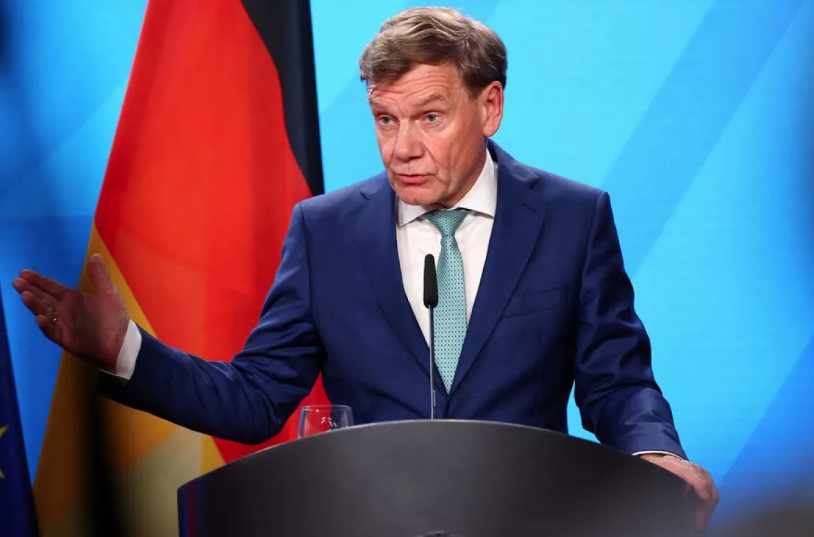German Foreign Minister Johann Wadephul has called for stronger international security guarantees for Ukraine, stressing that these protections should be “very close to what NATO membership means.” He made this statement in Berlin during an open house event organised by the German government, where the issue of Ukraine’s safety and defence took centre stage.
Germany Calls for NATO-Level Security Guarantees
Wadephul stressed that European nations alone cannot provide the guarantees. He insisted that a broader circle of countries must join in, with the United States taking a central role in shaping the commitment. Reports say nearly 30 nations, including countries outside Europe such as Japan, have already agreed to support Ukraine in strengthening its defence.
The German minister made clear that these security guarantees aim to deter threats. He explained that Ukraine must feel protected against future dangers in a way “approximately equivalent to NATO membership.” NATO, or the North Atlantic Treaty Organization, is a military alliance whose members pledge to defend one another if any of them faces an attack. Since Ukraine is not currently part of NATO, Wadephul stressed that international partners must ensure Kyiv receives a level of backing that comes as close as possible to this arrangement.
He explained that without strong security guarantees, Ukraine’s stability would remain at risk, and therefore the commitments must be meaningful, credible, and global in scope.
International Response After Russia-U.S. Summit in Alaska
Wadephul delivered his remarks just days after Russian President Vladimir Putin and U.S. President Donald Trump held a high-profile summit. The two leaders met on August 15 at a military base in Alaska, and governments around the world closely watched the event. Reports said the talks focused mainly on Ukraine’s security guarantees.
After the summit, Putin told reporters that discussions on resolving the conflict in Ukraine had dominated the agenda. He added that Moscow wanted to “turn the page” in its relations with Washington and even extended an invitation to President Trump to visit Moscow.
Trump described the talks as productive but admitted that the two sides did not reach a final agreement on several key issues. His comments showed that although they made progress, many disagreements remained unresolved. The Alaska summit drew global attention because it took place at a time when Ukraine’s security and sovereignty posed one of the most pressing issues for Europe and its allies.
US considers sanctions on Rosneft and Lukoil if ceasefire talks with Putin fail
The international discussions did not stop in Alaska. On August 19, leaders of the so-called “coalition of the willing” continued consultations on Ukraine in Washington. They held a videoconference to review options for supporting Kyiv. Shortly after, European Union leaders also convened an online summit to examine the same issue. Both meetings assessed the outcomes of the Russia-U.S. summit and discussed how global partners could coordinate more effectively in offering Ukraine the necessary security guarantees.
The fact that these discussions followed immediately after the Alaska talks showed the urgency felt among world leaders regarding Ukraine’s future defence framework.
Growing List of Countries Ready to Provide Security Guarantees
The German foreign minister highlighted that Ukraine is not alone in this struggle. According to him, around 30 countries have already indicated their readiness to back Kyiv in some form. What makes this development significant is that the group is not restricted to traditional NATO allies in Europe. Nations such as Japan are also part of this circle, giving the effort a truly global dimension.
Wadephul underlined that it is essential for Ukraine to have not just European backing but also the support of powerful allies from other regions of the world. This wider coalition of partners would make the security guarantees more reliable and harder to challenge. Among these supporters, the United States has been singled out as a crucial player, with its role described as central in shaping and enforcing the guarantees.
⚡ 5,000 lives a week at stake — Trump claims Putin shares urgency to halt Ukraine bloodshed
The discussions in Washington and Brussels reflected how deeply Ukraine’s protection has become a matter of global importance. Multiple countries and alliances are now engaged in talks, reviewing frameworks, and considering how to provide Ukraine with protections close to NATO standards.
Wadephul’s remarks in Berlin captured the essence of these efforts: while Ukraine may not be inside NATO, the security guarantees it receives must still give it the confidence of strong collective defence. For Kyiv, the international support now being mobilised may represent the most significant protection it has seen since the start of the conflict.
